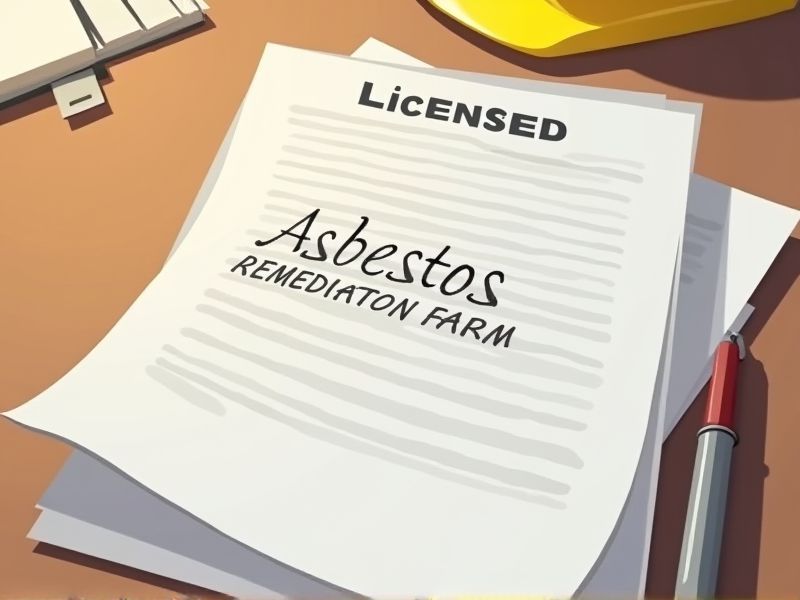
Asbestos remediation technicians deal with hazardous materials that pose significant health risks, so specialized training is essential to ensure safety. These professionals must possess an in-depth understanding of how to handle, remove, and dispose of asbestos-containing materials in compliance with strict regulations. Certification programs provide technicians with the knowledge to prevent asbestos exposure and the skills to execute remediation processes effectively. Important certifications needed for a Licensed Asbestos Remediation Technician include asbestos worker training and respirator safety courses.
State Asbestos Contractor License
A State Asbestos Contractor License ensures that remediation technicians meet specific training and safety standards crucial for handling asbestos materials. It helps protect public health by ensuring that technicians are knowledgeable about proper containment and disposal protocols, minimizing the risk of asbestos exposure. Regulatory compliance is maintained as the license facilitates state oversight, reducing legal liabilities for both technicians and employers. Having the license provides clients with assurance of the technician's expertise, increasing trust and potentially leading to more business opportunities.
Asbestos Abatement Worker Certification
Asbestos Abatement Worker Certification ensures that technicians understand the procedures to safely handle asbestos, reducing health risks associated with exposure to this hazardous material. Certified workers are trained to comply with legal regulations, which helps mitigate potential legal liabilities for employers. Certification programs provide hands-on experience and updates on industry standards, critical for maintaining proficiency and safety in remediation tasks. Employers and clients gain trust in certified technicians, as certification signals that workers possess the necessary expertise and commitment to quality service.
Asbestos Abatement Supervisor Certification
The asbestos abatement supervisor certification is needed to ensure that licensed asbestos remediation technicians adhere to safety standards and regulations. This certification equips supervisors with the necessary skills to effectively manage and mitigate asbestos exposure risks. Holding this certification helps in maintaining compliance with state and federal laws governing asbestos handling. It also increases credibility and trust with clients and regulatory bodies, as it demonstrates a commitment to professional standards in hazardous material management.
EPA Asbestos Renovation, Repair, and Painting (RRP) Certification
The EPA Asbestos Renovation, Repair, and Painting (RRP) Certification is essential for a Licensed Asbestos Remediation Technician because it ensures compliance with federal regulations that safeguard public health. Certified technicians have the knowledge to minimize lead-based paint hazards and prevent asbestos exposure during remediation projects. Without this certification, technicians may inadvertently release hazardous substances, posing risks to both workers and occupants. Regulatory compliance through certification also avoids potential legal and financial penalties for remediation businesses.
OSHA Asbestos Awareness Training Certification
OSHA Asbestos Awareness Training Certification ensures that licensed asbestos remediation technicians understand the health risks associated with asbestos exposure. Knowledge gained from this certification helps technicians identify asbestos-containing materials and implement appropriate safety measures. Proper training reduces the risk of accidental exposure to asbestos fibers, protecting both workers and the public. Compliance with OSHA standards prevents legal and financial penalties while emphasizing safety in asbestos remediation projects.
NESHAP Asbestos Certification
NESHAP Asbestos Certification is needed because it ensures that remediation technicians understand and comply with federal regulations regarding asbestos handling. This certification minimizes health risks associated with asbestos exposure by enforcing proper safety standards. Compliance with this certification is legally required to avoid penalties and ensure safe demolition or renovation activities. Certified technicians are more likely to employ best practices, reducing environmental contamination risks.
Air Monitoring Technician Certification
Ensuring a Licensed Asbestos Remediation Technician has an Air Monitoring Technician Certification enhances their ability to effectively assess air quality and detect harmful asbestos fibers during projects. Without this certification, a technician may lack the necessary skills to monitor airborne asbestos accurately, increasing health risks. Regulatory compliance often requires such certifications to meet safety standards and avoid legal penalties associated with improper asbestos management. Certification validates the technician's knowledge and competency, building trust with clients and employers concerned about health and safety.
HAZWOPER Certification
HAZWOPER Certification is essential for a Licensed Asbestos Remediation Technician because it provides training in handling hazardous substances safely, which reduces the risk of exposure. This certification ensures compliance with OSHA regulations, integral for maintaining workplace safety standards in environments dealing with toxic materials. It equips technicians with the necessary skills to respond effectively to hazardous waste emergencies, which is critical in asbestos situations. Possessing HAZWOPER Certification often enhances a technician's professional standing, increasing job opportunities and credibility in the field of hazardous waste management.
Certified Industrial Hygienist (CIH)
Hiring a Certified Industrial Hygienist (CIH) ensures that asbestos remediation adheres to established safety regulations, protecting workers and building occupants. This expertise allows for the accurate assessment of asbestos exposure risks, leading to effective control measures. A CIH provides essential oversight during remediation projects, minimizing the potential for environmental contamination. Their specialized knowledge contributes to more efficient project completion by identifying and addressing hazards proactively.
Certified Safety Professional (CSP)
A CSP has an in-depth understanding of safety principles, which is crucial for effectively managing the health risks associated with asbestos exposure. Proper asbestos remediation requires strict adherence to safety standards, and a CSP ensures compliance with these regulations to protect workers and the environment. The certification enhances credibility and trust, demonstrating to clients and employers that the technician possesses high-level expertise in managing hazardous materials. In projects where asbestos is present, a CSP can anticipate potential hazards and implement proactive measures to mitigate risks efficiently.
Summary
You can expect enhanced credibility and greater trust from clients when a Licensed Asbestos Remediation Technician obtains additional certifications. These certifications signify a technician's commitment to excellence, leading to increased employment opportunities and potentially higher income. Enhanced skills and knowledge ensure safer and more efficient remediation processes. Continuous learning through certifications fosters industry adherence and ensures compliance with evolving safety standards.
